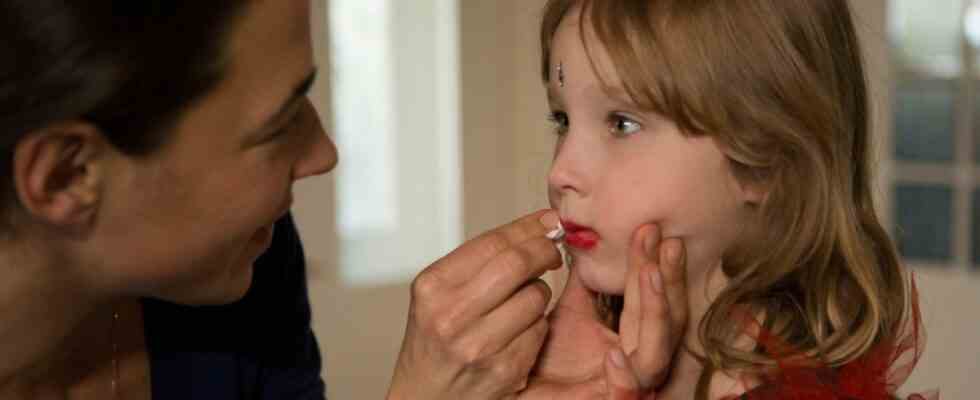Ronja is playing in the sandpit. She digs a hole. Deep enough to completely bury the male doll. The six-year-old puts them in this grave and throws sand at the little guy. “F91 Social Behavior Disorder, F93 Emotional Disorder of Childhood,” is the diagnosis made by Berlin psychotherapists Katinka (Judith Bohle) and Tom (Carlo Ljubek). Ronja apparently has a problem with other children – and with her little brother. He competes with her with her beloved estranged father, a fun-loving cook whom the little one tries to win over with lipstick and makeup during therapy sessions by role-playing with the therapist.
The other cases in the ZDFneo series are also factual safe on: Sam, 15 years old, disruption of social behavior with existing social ties. Jonas, 8 years, adjustment disorder with depression reaction after stressful situation. Nellie, 15 years old, panic disorder: The tone of the narrative is as documentary as the displayed symptoms safe. Which makes the sovereign concept of the series written and directed by Oscar winner Caroline Link very respectable. But can she also captivate?
Excellent actors, dialogues without embarrassing efforts at youth slang
Two things make Caroline Link’s first drama series worth seeing: Link’s art of leading the actors – combined with an excellent ensemble – and the fabulous dialogues that she wrote, which avoid embarrassing efforts to use youthful language. They give each of the scenes the tension that could also arise in reality when a psychotherapist meets a young patient. For example, when youthful brusqueness, stubbornness and laconicism meet and the therapists’ obvious efforts to create closeness. Closeness, which just must not be too routinely empathetic, too obviously calculating and loving.
Caroline Link is attracted to children for their ability to enjoy themselves and to be in the moment. The ability to look ahead and not dwell on the past, like adults, has always fascinated her, she says at a meeting in a Munich café. She sees them as dependent on the adult world into which they are born. But she doesn’t see children as victims or as weak. On the contrary: “I’m particularly interested in their robustness. In my films, when the children play the leading roles, they tend to be the ones who drive the story forward and are a bit ahead of the adults.”
This attraction has now produced a drama series with fictional cases, meticulously developed over the years in interaction with two child and adolescent psychotherapists. However, with a focus on children with behavioral problems. “Children are born as blank slates. They only become ‘problem children’ through contact with their environment and adults. I can forgive difficult children everything. I want to understand why they behave this way. And how one can help them can.” safe has become something of a tone-finding series. It is about the struggle to find the right tone, which enables the two psychotherapists to speak openly and trustingly with the very vulnerable, disturbed young people and thus to advance to the fears and injuries, where help can only really begin, with Ronja, Jonas, Samuel and Lottie.
Tension arises from helpless provocation, asking questions at the right moment
Link avoids breathing any gimmicky drama into her stories. Unlike the Oscar-winning film “Good Will Hunting”, in which the spectacular mathematical talent turned a youngster into a dazzling figure. Link’s restraint gives the subject the importance it deserves: the focus is on the children and young people, their personality and the concentrated work of the two psychotherapists. Whether it was absolutely necessary for an experienced colleague to present the guiding principles of the therapeutic sessions almost textbook-like during the supervision and for Katinka and Tom to nod sensibly like first-year students remains to be seen. Tension arises when young people try to evade through helpless provocation, when tricky questions are risked, when attention is generated that is supported by credible, not whispering interest. Psychotherapist Tom once asked the aggressive teenager Sam: “Doesn’t it get you down, always having to be such a tough guy?” “Should I cry?” Sam replies, “I prefer to be angry.” “You’d rather be angry than sad?” “However, my mother was always sad, my father was always angry, they are both dead.”
The fact that it isn’t made too difficult for the viewer despite all the problems described is also due to a little trick, although Caroline Link says she hasn’t given it a second thought as to who might be interested in this series. When she showed the consequences to the head of the Heckscher Clinic in Munich, one of the largest child and adolescent psychiatric facilities in Germany, she said that compared to her cases, these were abnormalities that were easy to treat. In fact: no major depression, no long-term anorexia, no suicide attempt. So is safe also become a series that gives hope that children and young people can find their way back to what Caroline Link appreciates about them: to feel joy when they think about what the future will give them.
Safe, ZDFneo, two episodes each Tuesday and Wednesday, 8:15 p.m.
You can find more series recommendations here.

